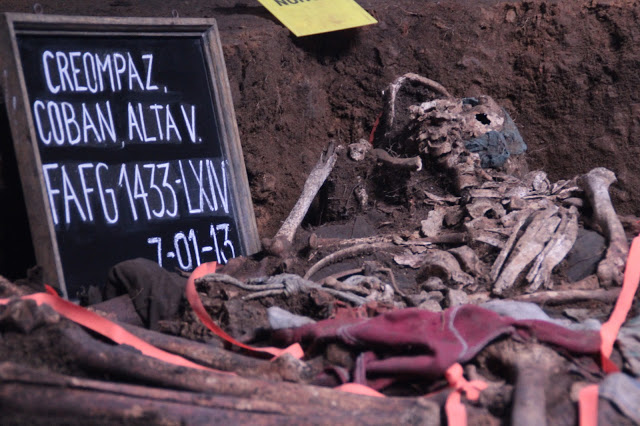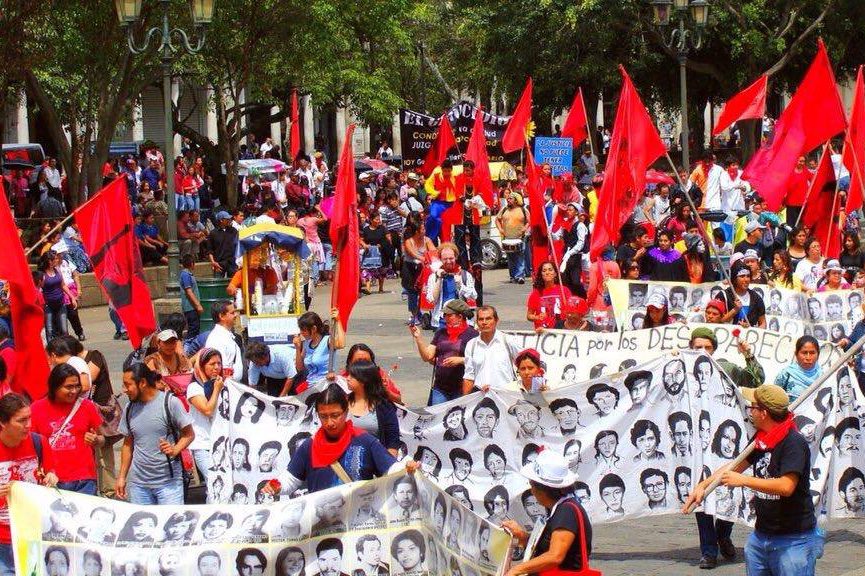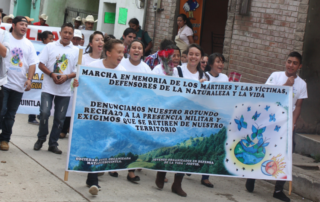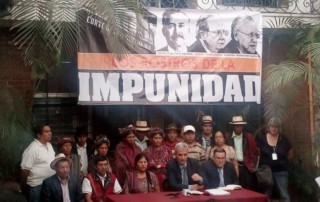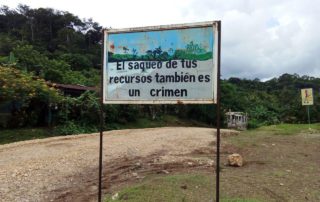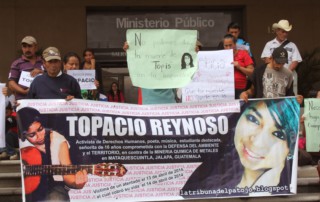Military Zone 21 – CREOMPAZ
On January 6, 2016, 14 former military officers were arrested on charges of forced disappearance and crimes against humanity based on evidence uncovered at the CREOMPAZ military center in Cobán, Alta Verapaz. Now a United Nations peacekeeper training base, CREOMPAZ (Regional Training Command for Peacekeeping Operations) operated as a detention and clandestine execution center during Guatemala’s Internal Armed Conflict, when it was known as Military Zone 21. Between 2012 and 2015, the Forensic Anthropology Foundation of Guatemala (FAFG) carried out 14 exhumations at CREOMPAZ and found 558 human remains in fourteen graves, representing the largest known case of forced disappearance in Latin America.
Spanning crimes committed from 1981 – 1988, the Military Zone 21 (CREOMPAZ) case sets the record in Guatemala, not only for the number of disappeared victims, but also for the time span over which the crimes were committed. Among the high-ranking individuals indicted is Manuel Benedicto Lucas García, who served as former Army Chief of Staff during his brother’s 1978-1982 military dictatorship, and who is currently imprisoned for his role in crimes against humanity committed against the Molina Theissen family. The trial is an important step in the legal trajectory seeking justice for crimes against humanity and represents more than 30 years of hard work by survivor organizations.
In-depth NISGUA reports
The same people who carried out genocide in Nebaj were the same who carried out genocide in Plan de Sánchez and throughout Baja and Alta Verapaz. It’s important that the high- ranking military command are tried for these crimes.
Latest from our blog
British Columbia Securities Commission Asked to Investigate Mining Company’s Failure to Disclose Material Facts to Investors
Justice and Corporate Accountability Project (JCAP) – Network in Solidarity with the People of Guatemala (NISGUA) – Maritimes-Guatemala Breaking the Silence Network (BTS) – MiningWatch Canada – Diocesan Committee in Defense of Nature (CODIDENA) (Guatemala [...]
Join us on tour this Fall with JODVID!
This fall, we’re excited to welcome Alex Escobar Prado as the featured speaker for this year's tour, "Guatemalan Youth in Defense of Land and Life!" Alex is an activist, educator, and a member of the [...]
Solidarity Update: May 2017
News recap: Motions filed against former Constitutional Court judges for breach of duty in overturning the genocide verdict; Ríos Montt to stand trial for genocide for his role in the Dos Erres massacre; Accompanier perspective: [...]
Movements resisting resource extraction are being met with targeted violence
Over the last several decades, transnational resource extraction companies have flocked to Central America. Licenses to construct hydroelectric dams, exploit minerals, or build the necessary infrastructure to make these types of projects possible are [...]
Más de 2.900 personas de 59 países distintos piden al Ministerio Publico de Guatemala que investigue el asesinato de defensora del medio ambiente
Comunicado de Prensa 17 de mayo de 2017 (Guatemala / Oakland, CA / Tatamagouche, NS) - El miércoles se entregó una carta al Ministerio Público de Guatemala en nombre de más de 2.900 personas que [...]
More than 2900 concerned individuals from 59 countries ask Guatemalan Public Prosecutor’s Office to investigate murder of environmental defender
Press release May 17, 2017 (Guatemala/Oakland, CA/Tatamagouche, NS) -- On Wednesday, a letter was delivered to the Public Prosecutor’s office in Guatemala on behalf of more than 2,900 people requesting an immediate and thorough investigation [...]

